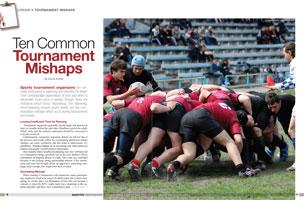
 |
| © Alex Ishchenko - Dreamstime.com |
Sports tournament organizers are normally meticulous in planning and attention to detail. Their considerable expenditure of time and effort is admirable. Every once in awhile, though, there are mistakes which occur regardless. The following, encompassing various sports levels, are ten commonplace mishaps which occur during tournaments and events.
Leaving Insufficient Time for Planning
Tournament organizers generally should begin this process at least six months before the start date. Deadlines need to be established early, and the mission statement should be conveyed to everyone involved.
Unfortunately, sometimes important details are left for late in the process, and results suffer. By not planning ahead, last minute changes can cause confusion, and this leads to unnecessary expenditures. Mistakes happen at an increasing rate when plans are rushed, and quality of performance diminishes.
One example where insufficient planning may very well have led to a tournament being cancelled was at the now defunct LPGA tournament in Kapoula Resort in Oahu. The event was cancelled because it was lacking strong sponsorship interest. If the tournament and tour had brought about an aggressive marketing campaign early enough, this might have been avoided.
Scheduling Mishaps
When running a tournament with numerous teams participating, organizers need to be aware of which teams have issues competing on certain days. An illustration of how this can become a concern is when the BYU rugby team was competing in the national playoffs, and they were scheduled to play on a Sunday. The problem was that the members of the team were of the Morman faith, which disapproves of playing sporting events on Sundays. In previous years, the BYU women were accommodated to play their games on Saturdays. This time, due to a mistake by the tournament organizer, it was too late for a change, and the BYU team chose to forfeit.
Frequently, tournament organizers cannot oblige teams for religious and other reasons. With proper planning, and an awareness of special needs, these conflicts can be avoided.
 |
| Steve Cherundolo of the United States kicks the ball during a FIFA 2010 World Cup soccer match against England June 12, 2010 in Rustenburg, South Africa. © Diademimages - Dreamstime.com |
Incorrect Use of Volunteers
At tournaments volunteers are frequently placed in positions for which they are unsuited. This could mean either positions on committees, or charged with tasks to perform. If they are not passionate or knowledgeable about a certain function, results can suffer.
Scott Gilmore, the director of tennis at WaterColor Inn and Resort, in Santa Rosa Beach, Florida, states that "volunteers should be given small jobs they are passionate about." With his many years of running tournaments, he has found volunteers will be most productive when given focused tasks they are interested in.
If these individuals are placed in correct situations, time and money is saved, with a more efficient operation likely.
Poor Communication
Inadequate communication can be a significant factor in the downfall of a tournament. Sometimes, the simple act of letting teams know all the contact information and policies can lessen the chance of mishaps.
Once, when I was coaching a youth travel basketball team, we were asked to play in an invitational tournament. This was a three day contest, and during the second day there was a storm enveloping the area. My team, after finding out the game was on, arrived at the gym only to be informed that the squad we were scheduled to play was not showing up. The tournament organizer could not find the contact data for the other team, and they were given incorrect information by someone else regarding the game’s status. Unfortunately, the other team was defaulted because of this impaired communication.
 Inappropriate Safety Guidelines
Inappropriate Safety Guidelines
What can be more important when running a tournament than installing safety measures for participants, workers and spectators? Yet, often this key element is not given the attention needed.
One illustration of this was at the recent Vancouver Olympic Games. There were twenty thousand standing room tickets that had to be voided at the snowboarding venue. This was because fans had fallen between bales of hay under the melting layers of trucked in snow. Unexpected warm weather caused safety issues the organizers were ill prepared for.
Refunds were given, but with the lost revenue and disappointment of fans, even events at the highest level will slip in their responsibility for providing appropriate safety.
Transportation Issues
Transportation concerns at events are areas that too often go unaddressed as needed. Sometimes organizers will carefully take care of the teams travel plans, but for tourists and spectators, there might not be the attention given that it requires.
An example of this was during the recent World Cup Soccer games in South Africa, before the USA vs. England match up. Tourists, going to Rustenburg for the game, were delayed many hours, and arrived just shortly before kickoff. The delays were caused because there were not any buses or trains going to Rustenburg or anywhere nearby.
If this mistake can happen on such a scale as the World Cup, it is easy to see how planners at smaller venues can be remiss in advising travelers on alternate modes of travel.
Faulty Internet Technology
With large and modest sports events, public news organizations rely on receiving results in a timely manner. Unfortunately, this has not always been the case.
At the 1996 Olympic Games, which some have referred to as "The Glitch Games," there were internet difficulties which made many extremely unhappy. The website was slow to surf, and the seven main IBM systems that were to provide results for news services did not function properly. As a consequence, sometimes these organizations were left to receive reports from runners delivering pieces of paper.
These news organizations, which paid good money for prompt information, were left considerably frustrated by those technological breakdowns.
Not Spending Enough Time Working With Sponsors
Having solid sponsors on board can mean the difference between a successful event and one that fails. They can offset the costs of a tournament and provide prestige. A sponsorship agreement should include all pertinent details, so there are not any misunderstandings regarding working together. Without devoting time to develop these relationships, tournaments falter.
Manny Iqbal, director of the Port Washington Tennis Academy, states that "without sponsorships in place, it is becoming much more difficult for tournaments to survive." He states as an example, one of the previous leading warm-up tournaments to the U.S. Open, The Hamlet, not being able to survive in part because of insufficient sponsorship arrangements.
Not Adjusting to the Economic Environment
With the current unstable economic environment, tournament planners have had to make adjustments similar to other businesses. When running a tournament, to attract teams and players, financial considerations are paramount. Before entering the event, there is more of a premium than ever on affordability.
Therefore, whether it is lodging accommodations, travel considerations, or tournament fees, astute organizers see the necessity of having fees lowered in these areas. Even though this can translate into lower profit margins, it is better to collect less revenue than not having a tournament at all.
Lack of Contingency Plans
No matter how well run a tournament is, there are usually situations out of one’s control. How planners react to these circumstances can determine the success of an event. Inclement weather is an example of an issue tournament planners need to be prepared for.
One instance where this became a problem was in the women’s college softball New Jersey Athletic Conference tournament over one year ago. A rain date was not scheduled, and as luck would have it the finals game was rained out, and a winner was not decided. There was a NCAA berth on the line, but because the final could not be played, the berth was given to a team that did not even make the finals.
To help prevent some of the above mishaps, tournament organizers would be wise to contact the local sports commissions or convention and visitors bureaus for consultation before and during the tournament.

